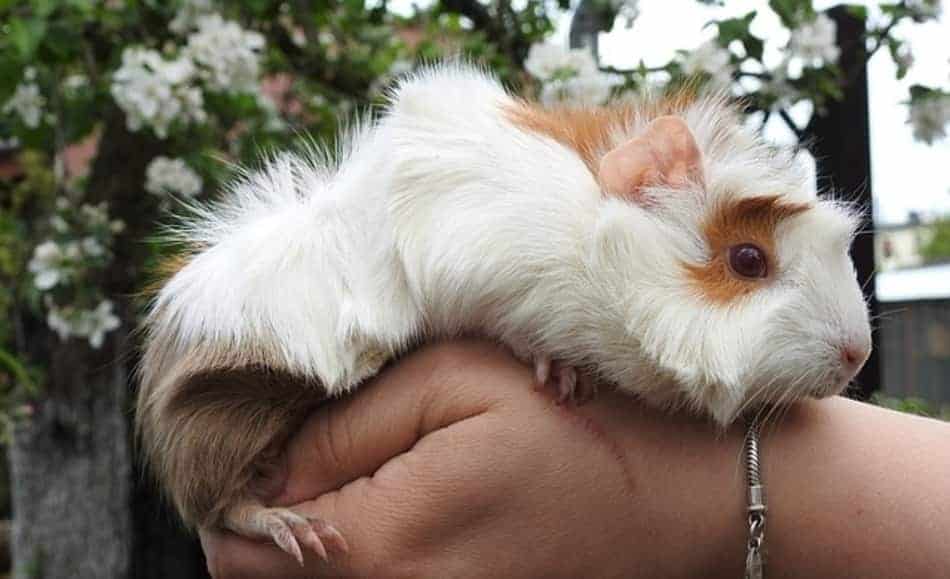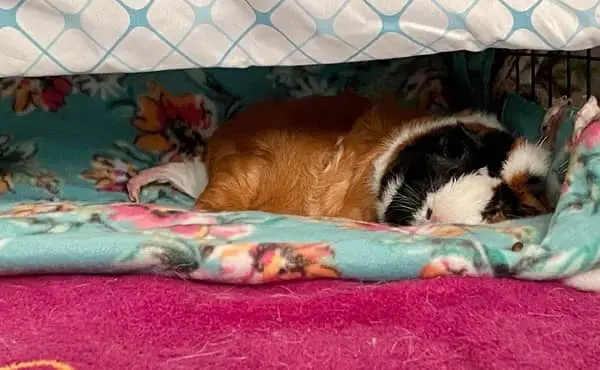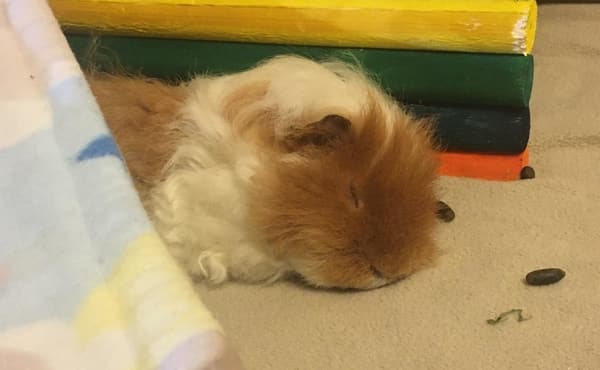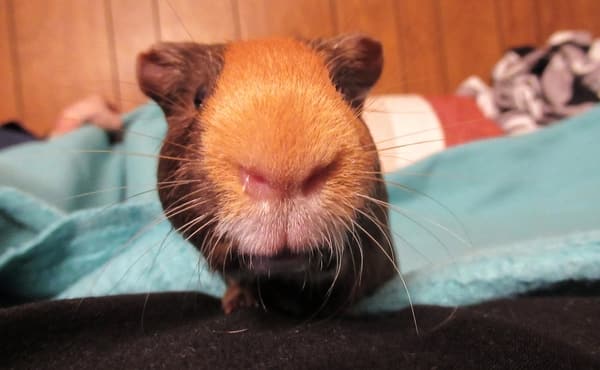Guinea pigs make great pets for people of all ages—they are laid back, relatively easy to care for, and highly social. Because of their social nature they have all sorts of silly quirks, some of which confuse us as much as they entertain us, like when they hide in our hair.
So, why does my guinea pig hide in my hair? Given how social your furry friend is, they likely are seeking out comfort and familiarity with you. However, they might also be a little stressed out, sick, or they simply enjoy the feeling of your hair.
This article will examine your guinea pig’s social needs and what comforts them, what stresses them out or triggers fear, behaviors they display when ill, and a personal quirk or two.
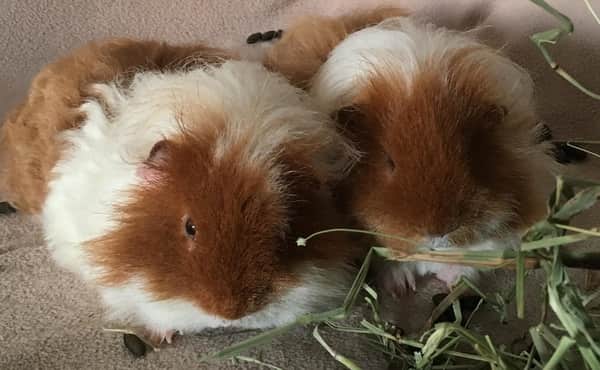
Social and Snuggly
Guinea pigs are highly social by nature—they live in family groups in the wild called herds and enjoy being amongst others of their own kind, both in the wild and in our homes. They establish hierarchies with their herds or cage mates, they stimulate each other, help each other gather food in the wild, and help groom each other.
They have numerous ways in which they communicate with each other and with humans that include vocalizations and body language. In all, our furry friends are quite affectionate and expressive.
Most guinea pig owners know how vocal and animated their furry friends are, so much of this may not come as a surprise. However, as much as guinea pigs thrive in each other’s company, our domestic pals love and want our affection too!
Guinea pigs are known to benefit not only from the company of their own kind, but from the company of humans as well. They form bonds with their people just like cats and dogs do, and recognize certain people based on scent, sound, and sight, typically showing favor to those who spend the most time with them.
Many piggies enjoy playing with their humans, spending time in our laps, cuddling, receiving pets, and of course getting treats! So, if your guinea pig always hides in your hair, it likely is because they love your company and are seeking comfort from and familiarity with you.
Hiding behavior in general is completely normal in guinea pigs, so if your piggie pal is seeking refuge with you, take it as a compliment! They are comfortable with and feel completely safe with you. Since guinea pigs are prey animals, which we will discuss more in depth shortly, your companion feeling safe and calm with you speaks volumes about your bond.
When your guinea pig snuggles up into your hair to hide, they probably are enjoying being close to you and your scent—after all, scent is one of the ways with which they recognize their people.
Other signs of a content guinea pig to look for are “wheeking” (an excited squeal or whistle), deep purring, or hopping and jumping for joy (known as popcorning). Nose rubbing and snuggling are part of a guinea pig’s contextual body language repertoire, so barring any other signs or situations, there is absolutely no cause for concern. Enjoy all those furry, fluffy snuggles!
If your guinea pig is brand new to your home or is showing you other signals that do not necessarily translate to contentedness, your pal might be stressed out or insecure.
Deep Breaths
As we briefly mentioned earlier, guinea pigs are prey animals which means they are food for several larger (and, to a little piggie, quite scary) predators in the wild. Understandably, for such a small creature on the menu for many other animals, stress, fear, and insecurity come naturally.
Even though the wild piggies from which our domestic pals descend no longer exist in the wild, guinea pigs cannot help but retain their instincts, even in our air-conditioned, predator-free domiciles.
It is because of these instincts that our companions’ ancestors, and their modern-day wild cousins, survived for so long. By nature, guinea pigs are wary, nervous, and fearful of almost everything—larger animals, loud or suspicious noises, unfamiliar objects, and so on.
Even our homes, which we humans typically consider quite safe and secure, can be scary places to our tiny friends, especially during periods of transition. If your pal is new to your home or has suddenly taken to hiding in your hair, it might be experiencing stress, fear, or insecurity related to the environment.
If you suspect your guinea pig is experiencing uncharacteristic anxiety, look for some of these other signs as indicators of your pal’s feelings:
- Lethargy
- Nervousness and/or irritability
- Reluctance to being handled
- Freezing in place
- Decreased appetite
- Negative vocalizations (hissing, teeth chattering)
- Head tossing
There are several things that could be causing your pal stress, so you will have to use your own instincts to narrow it down. For instance, if you just brought your pal into your home from a shelter, pet store, or breeder, they might be having trouble adjusting to their new home.
A completely new, unfamiliar environment with new sights, sounds, and scents is likely to be extremely overwhelming for your furry friend. Conversely, if your pal has been around for a while but has suddenly started hiding in your hair, consider what has changed. It could be something as simple as rearranging the furniture or as complicated as moving into a new home.
Further, day to day things we may take for granted could be upsetting your furry friend as well. Loud, sudden noises, rambunctious children, or other pets (especially larger, “predatory” animals like cats and dogs) are all potential sources of stress and fear for your friend.
Finally, guinea pigs are creatures of habit and thrive on routine—so if the schedule for you or your household in general tends to be hectic and unpredictable, it may be having an impact on your pal.
Remaining calm and stress-free is essential to a guinea pig’s wellbeing, so it is our job to help them feel safe and secure in our homes. There are plenty of ways to do this, the most important of which is to create and maintain your bond with your piggie.
Spend plenty of time calmly and gently talking to your pal, especially before you attempt to handle them. Always let them know you are nearby, and always use calm, peaceful movements when you handle them. Give them plenty of pets and treats, and make sure they spend at least two or three hours outside of their enclosure per day.
To the best of your ability, help young children understand these rules, and ensure other pets do not share the same space with your piggies. Reduce or eliminate loud noise or harsh light, and try to conduct activities (mealtimes, floor time, petting/snuggle time, etc.) around the same time every day to create a sense of routine for your pal.
If you dedicate time to ensuring your furry friend feels safe and welcome in your home, you will reap the benefits in the form of a loving, affectionate friend for years to come!
If stress is not the culprit behind your guinea pig’s antics, it is time to eliminate the possibility of illness.
I’ll Need to Take a Sick Day Today
Guinea pigs are hardy creatures, and despite how vocal and sassy they are when they want something from us, they are typically quite reluctant to tell us when they feel sick. This can clearly pose problems when it seems that your pal is under the weather.
This is one of the many reasons it pays to dedicate plenty of time to developing and maintaining the bond between you and your piggie so you can tell early on if something is wrong.
Guinea pigs may try, at least initially, to hide their symptoms when they are sick or injured. This is another prey animal-driven instinct—in the wild, a sick or injured animal is “easy pickins” for predators, making them vulnerable and first up on the menu.
Therefore, when your pal feels a little green around the gills, they will try to hide it from you even though there is clearly nothing for them to fear in your home. Do not take this personally—it does not say anything of the bond between you and your piggie, it is simply their instinct to do so.
Fortunately, despite their best efforts, there are some tell-tale signs guinea pigs show us when they are feeling sick, one of which is increased hiding. So, if your pal has recently picked up this behavior of hiding in your hair and is demonstrating other signs and symptoms, they might be suffering from an illness.
Other symptoms to watch out for, seen frequently in common guinea pig ailments such as gastrointestinal (GI) conditions, respiratory infections, parasitic infections, and so forth, include some of the following:
- Decreased appetite/thirst
- Lethargy
- Hunched posture
- Audible breathing problems
- Discharge from eyes or nose
- Change to or lack of urine or feces
- Unkempt coat or hair loss
- Compulsive scratching or grooming
- Uncharacteristic behavior
If you suspect illness may be what is driving your pal into your hair, schedule a visit with your veterinarian as soon as you can. Many common afflictions that affect guinea pigs may sound low threat, but because our pals are so small, they can become serious quite quickly if they are not caught and treated early.
Fortunately, treatment for most conditions is straightforward so you can get back home with your companion and listen to them squeal at you for more treats in no time. If none of these possibilities are ringing any bells for you, perhaps your pig just likes your hair!
Gimme That Beautiful Hair!
Like almost all animals, including us humans, guinea pigs have their own unique personalities that vary from individual to individual. With these different personalities come different personality quirks.
For example, some guinea pigs are natural explorers and will take every opportunity to explore outside their cage they are given, while others are more than content to sit in your lap and serve their kingdom in comfort. Some piggies are quite shy while others are extremely outgoing and affectionate.
Some guinea pigs love chewing on toys while others enjoy chewing on…hair? Does your pig chew or “groom” your hair when they hide with you? If so, your pal might be practicing social grooming with you.
There is nothing inherently wrong with this behavior, but make sure they are not ingesting any hair they have “groomed” for you, as this could cause a blockage in their delicate GI tract which could become serious if not treated.
Conclusion
If your guinea pig likes to hide in your hair, there is a good chance it is because your piggie feels safe and comfortable with you! This is a good sign, so do not worry about this behavior if your pal is not showing you any negative signals.
Conversely, if your companion is demonstrating signs of stress and hiding in your hair, there may be something about the environment that is causing fear or anxiety. Evaluate your home and the room in which your pal lives and do your best to make the area welcoming and calm for your furry friend.
Further, if your guinea pig exhibits symptoms of illness while hiding in your hair, it likely is time to call your veterinarian. Fortunately, treatment is usually fairly straightforward for your pal.
Finally, it could be that your guinea pig simply likes being in your hair! There is nothing wrong with this behavior, but make sure if your friend is “grooming” you, they do not ingest any of your hair and harm their delicate GI systems.
In any case, your guinea pig hiding in your hair is no cause for concern in itself, so if you are paying attention to your pal’s contextual communication and tuned in to your bond, enjoy the snuggles and affection of your tiny pal as long as you can!

